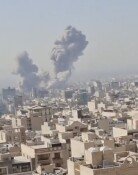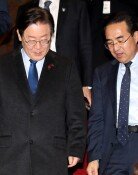[Editorial] Signs of Compromise?
[Editorial] Signs of Compromise?
Posted February. 22, 2006 04:32,
Lee Jae-oh, the floor leader of the opposition Grand National Party, summarized Koreas economic situation in a National Assembly floor speech, saying, The economy is failing, the public feels pain, society is in chaos, and our relations with other nations are shaky.
He listed depressing figures: the number of Koreans living in poverty increased to 7.16 million (meaning one-seventh of the public is poor); average household debt surpassed 300 million won for the first time; and the number of the unemployed youths increased to 400,000. The current administrations anti-market and anti-business policies and those unfavorable to the general public has resulted in economic sluggishness, making the middle class and the general public poor, Lee said. This ended up as Koreas worst-case bi-polarization situation. Tax increases and a bigger government will not be able to resolve that.
The numbers he cited reflect the current economic status of Korea and the plight of those who can be categorized as the poor of Roh. This diagnosis of the causes of Koreas economic problems ring true in a bigger perspective as well. Koreas national debt increased to 279 trillion won, meaning that even a newborn baby is born with a financial debt of 6.5 million won. And yet, the Roh administration is busy increasing taxes and the number of public servants on its payroll. One needs to pay attention to Lees suggestion, saying, With the four trillion won that was paid out to the 40,000 public officials who have been hired over the past three years, 1.2 million jobs could have been created.
Nevertheless, the ruling party is failing to recognize reality. Kim Han-kil, the floor leader of the ruling Uri Party, said that efforts will be made to resolve socio-economic divides in a National Assembly speech two days ago. But he mostly blamed external factors: the after-effects of bailouts from the International Monetary Fund (IMF) and those who created enormous wealth without any effort. There is no soul-searching for internal factors by the government, and no attempts to address big governments inefficiencies, distribution-oriented economic policies, and tax bomb tax policies.
Ruling Uri Party leader Chung Dong-young has disappointed people even more with his actions. Taking office, he declared he would support power changes in local regions. But as soon as the primaries ended, he went to Daegu and called the Grand National Party a public enemy, dubbing it, The party for the rich and the well-off. When he visited the cemeteries of those involved in the People`s Revolutionary Party incident, he urged an end to the Park Jung-hee era.
Major political leaders, including Chung, seem to be obsessed with earning votes for the May 31 local elections. Cheong Wa Daes dispatch of current ministers to the local elections shows how irresponsible its national affairs management is.
Lee admitted during his speech yesterday the mutual responsibilities of the opposition party, saying, I dont intend to put all the blame on President Roh and Cheong Wa Dae for the divides. We are looking back on whether or not we brought up the pro-North Korea theory, and took the offensive, adding, Please, no more fighting and listen to what the people want because this administration only has two years left.
It seems like the two parties have switched attitudes. It is hoped that the ruling party will move away from confrontation and toward win-win politics.







